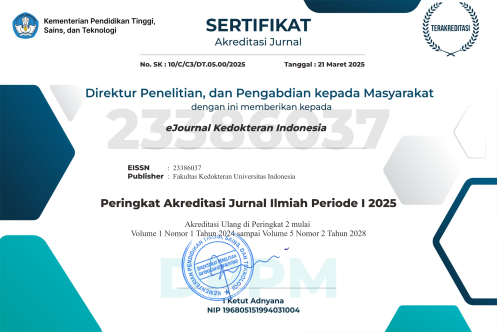Association Between Risk of Malnutrition and Surgical Outcome in Ovarian Cancer Patients
DOI:
https://doi.org/10.23886/ejki.9.71.203-7Keywords:
length of stay, malnutrition, ovarian cancer, surgical factorAbstract
Ovarian cancer is the fourth most cancer in Indonesia. Treatment of ovarian cancer is surgery. Malnutrition may complicate healing, so studying the association between malnutrition and surgical outcome in ovarian cancer patients is necessary. A cross-sectional study was conducted in Dr. Cipto Mangunkusumo General Hospital from July 2018 - March 2019. fromo 63 patients underwent surgery, four were excluded due to non-malignant ovarian pathology results. Parameters assessed were characteristic subjects and risk factors of malnutrition in ovarian cancer patients. Malnutrition was assessed using the Patient-Generated Subjective Global Assessment (PGSGA) and surgery factors assessed were the length of surgery, size of the tumor, and blood loss during surgery. The nutritional status was classified as well-nourished and malnourished. The receiver operating characteristic (ROC) curve is used to assess malnutrition, length of stay, size of the tumor, and blood loss during surgery. The result shows that the prevalence of malnutrition in ovarian cancer was 78% (moderate was 42.4% and severe was 35.6%), and the median length of stay was eight days. There is an association (chi-square test, p<0.05) between malnutrition and surgical outcome in ovarian cancer patients. Malnutrition is associated (chi-square test, p<0.05) with a length of stay and increased blood loss during surgery.
Downloads
Downloads
Published
How to Cite
Issue
Section
License
Copyright (c) 2022 Fitriyadi Kusuma, Mutiara Riani, Fiastuti Witjaksono

This work is licensed under a Creative Commons Attribution-NonCommercial 4.0 International License.



